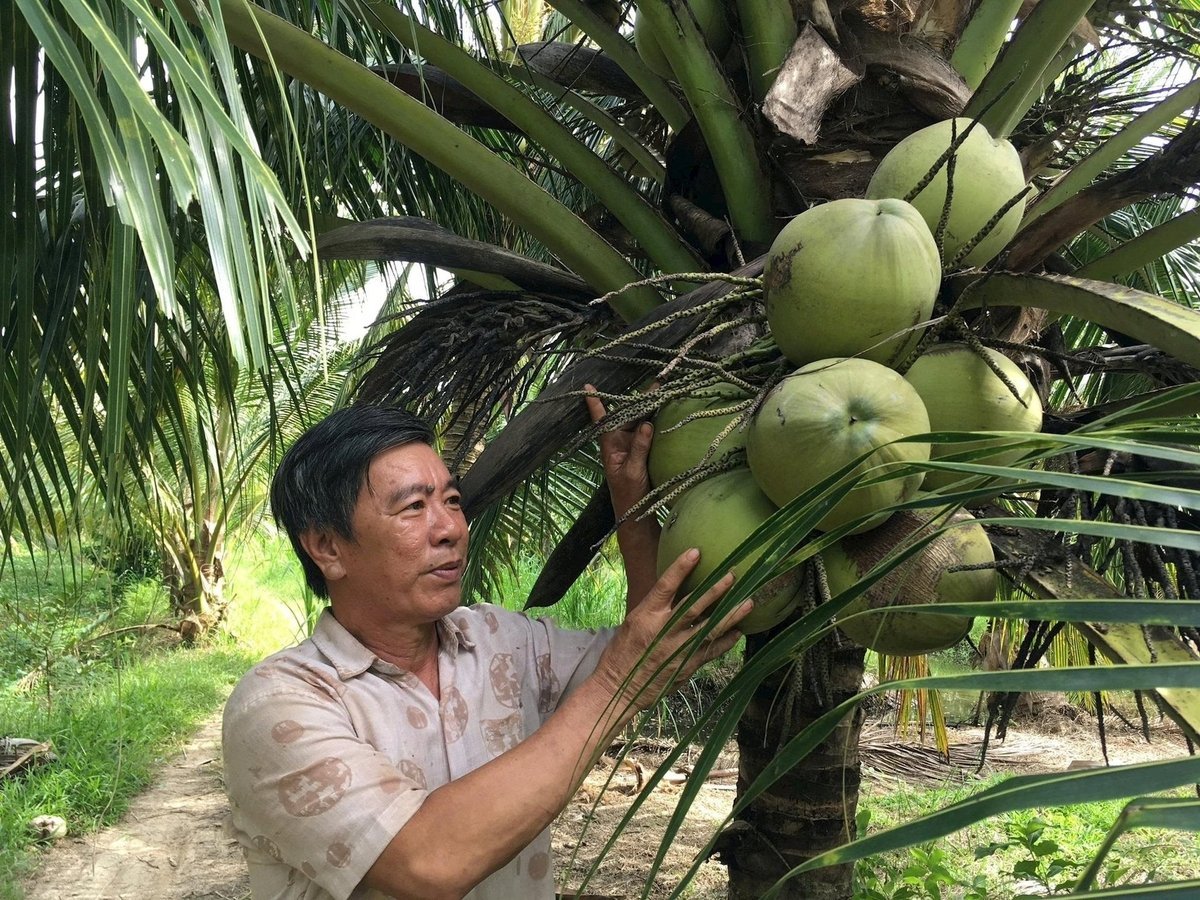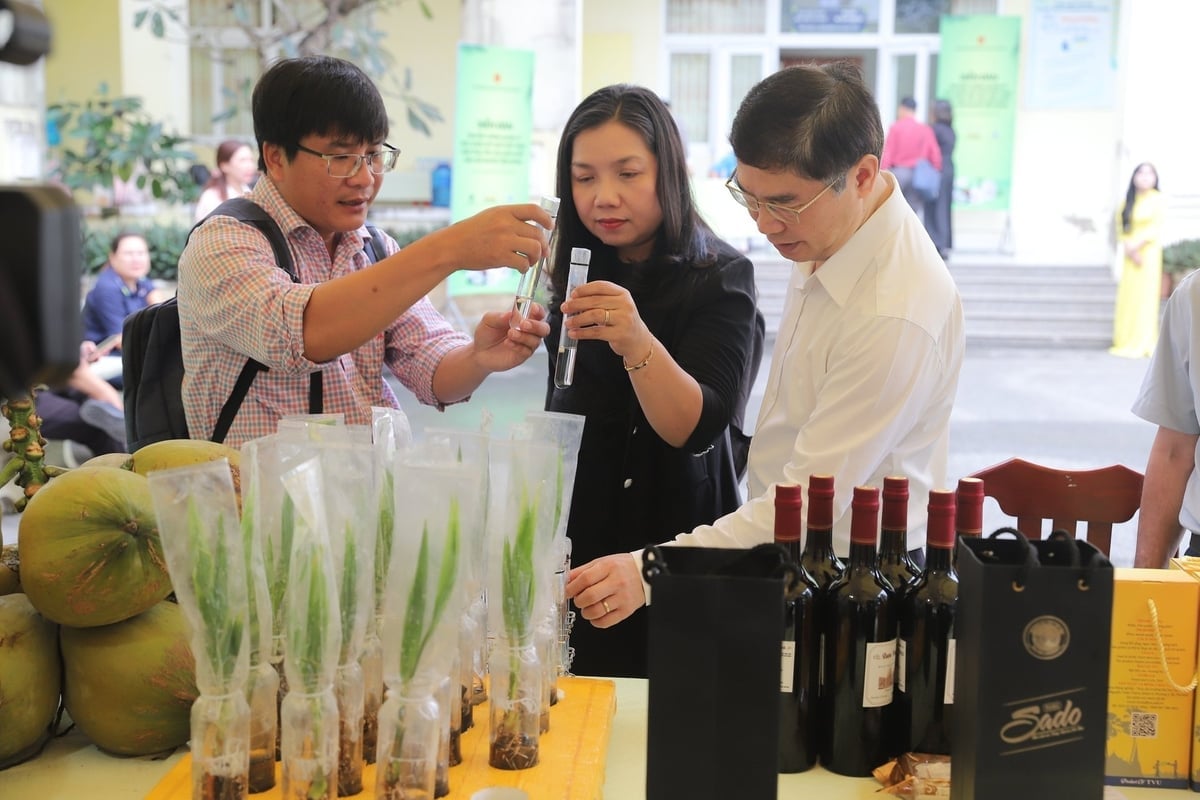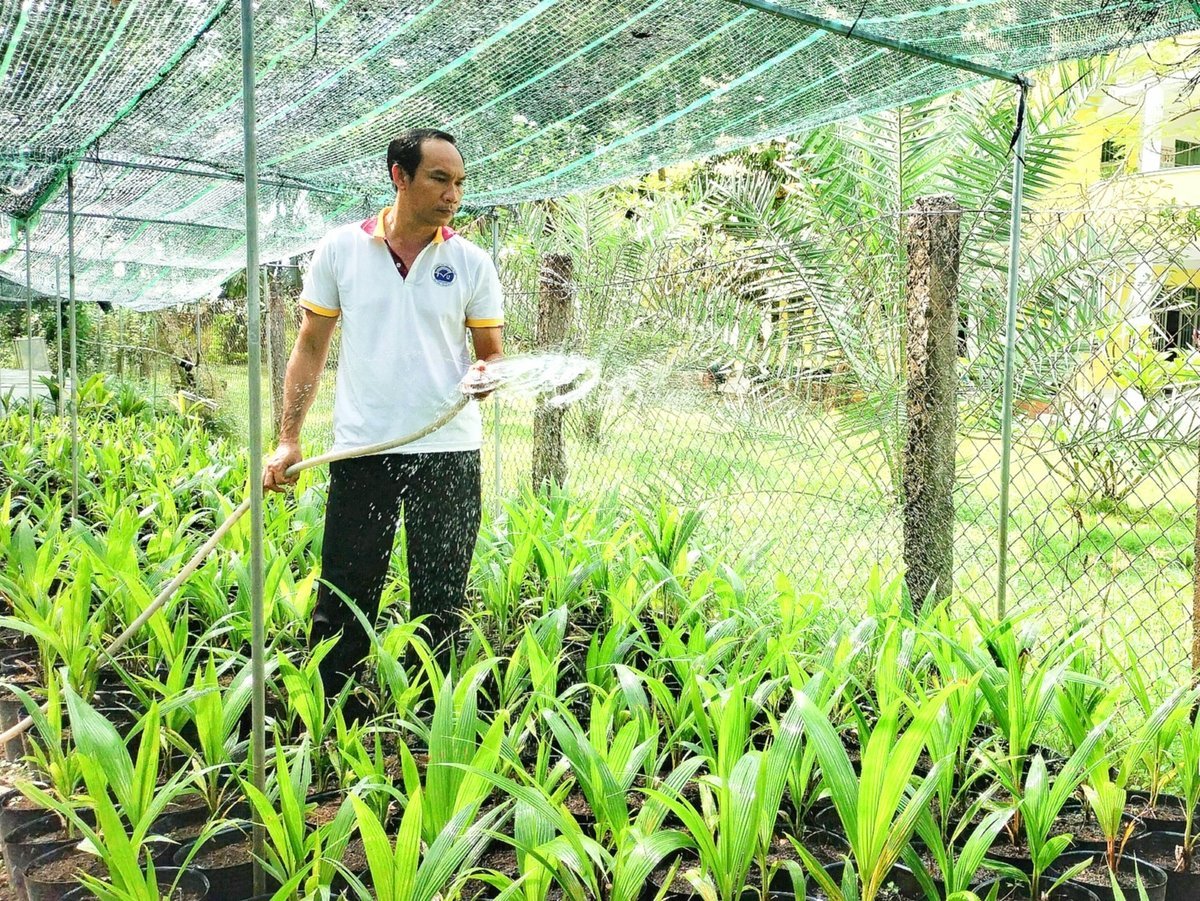The coconut tree has long been a distinctive agricultural symbol of the Mekong Delta region. Not only does it bring high economic value, but it is also closely linked to the livelihoods, culture, and adaptability of the people in the Western region to the harsh environment. In the context of increasing demand for coconut products, complex climate change, and significant pressure for replanting, the application of science and technology in breeding, cultivation, and processing is opening up a sustainable development direction for this important industry.

The coconut tree is a symbol of agriculture in the Mekong Delta. Photo: Mekong Delta Coconut Institute.
According to Master's degree holder Nguyen Ngoc Trai (Mekong Delta Coconut Institute), coconut trees are currently grown in 93 countries and are considered the "tree of life" due to their high adaptability to drought and saline intrusion conditions, as well as their versatility. In particular, coconut trees can thrive in conditions of limited water and nutrients, absorbing an average of 24.1 tons of CO₂/ha/year, making a significant contribution to mitigating the impacts of climate change.
Mr. Trai stated that coconut trees require soil with a high organic matter content, rich in macro, micro, and trace minerals, loose and well-drained to prevent root rot, while maintaining the necessary moisture. These favorable ecological conditions help coconut trees develop sustainably, yield stable productivity, and are less affected by environmental factors. The Mekong Delta, with its suitable soil characteristics and large concentrated coconut growing areas, is currently the main contributor to the country's coconut production and export value.

Tra Vinh University has successfully researched and developed wax coconut cultivation using embryo and tissue culture techniques, helping to increase the yield of wax coconuts and expand the area of wax coconut cultivation in Vinh Long. Photo: Minh Dam.
Over the years, domestic institutes, universities, and businesses have achieved outstanding results in coconut breeding, especially with three main groups of varieties: oil-producing coconuts, drinking coconuts, and waxy coconuts. However, traditional propagation methods still have many limitations, such as long growth periods, difficulty in rapid propagation, and inconsistent seed quality due to farmers' self-propagation of seedlings. This leads to unstable yields and difficulty in meeting the growing demand for replanting.
To solve this problem, many modern technologies have been applied. Most notably, molecular biotechnology for breeding, advanced hybridization techniques, and especially micropropagation technologies such as tissue culture and embryo culture. This is a breakthrough that helps to rapidly multiply large quantities of high-quality, uniform seedlings while preserving the desirable characteristics of the mother plant.
Among them, the waxy coconut from Tra Vinh – a rare and precious specialty coconut variety – is a clear testament to the success of Vietnamese science and technology. The Institute of Oil and Oilseed Crops Research was the first unit to propagate waxy coconuts using sexual embryo culture methods with a success rate of over 60%. Subsequently, Tra Vinh University improved the process through a Ministry of Agriculture and Rural Development-funded project from 2017 to 2022, increasing the success rate to 63% and commercializing seedlings since 2011. As a result, the area of waxy coconut cultivation has expanded, and productivity has significantly improved with the percentage of waxy fruits reaching 85-95%.
Besides studying varieties, soil assessment is also emphasized. A survey of 200 coconut plantation soil samples in Vinh Long showed that most soils have an average pH of 7.2, suitable for the nutrient absorption capacity of coconut trees. However, the nitrogen content is quite low, requiring farmers to adjust fertilizer application and cultivation techniques to improve the yield and quality of their coconut plantations.

A coconut plantation with waxy coconut seedlings on the campus of Tra Vinh University. Photo: Minh Dam.
Along with varieties and cultivation techniques, deep processing is considered key to enhancing the value of Vietnam's coconut industry. Global demand for coconut products such as coconut oil, coconut water, activated charcoal, cosmetics, and functional foods is constantly increasing. The waxy coconut, with its dense, sticky flesh, has the potential to be processed into many high-end products, from food to medicinal ingredients.
Currently, many research institutes and universities are focusing on extracting bioactive compounds, improving post-harvest technology, and supporting businesses in commercializing products. This contributes to expanding markets, increasing income for coconut farmers, and reducing dependence on raw material exports.
Based on analyses and research results, the Mekong Delta Coconut Institute proposed six strategic orientations for the comprehensive development of the coconut industry in the coming period. Master's degree holder Nguyen Ngoc Trai suggested prioritizing the application of biotechnology in breeding high-quality coconut varieties that are adaptable to climate change and saline intrusion, especially for the three main groups of varieties.
Simultaneously, strengthen research on coconut diseases in a biosecure manner to ensure stable production. Promote research on deep processing and extraction of bioactive compounds to enhance economic value. Support businesses in commercializing coconut and waxy coconut products. Develop circular agriculture, utilizing coconut by-products as organic fertilizer or value-added products. Apply artificial intelligence (AI) in pest and disease monitoring, environmental forecasting, and smart coconut plantation management.
Source: https://nongnghiepmoitruong.vn/chia-khoa-nang-gia-tri-nganh-hang-dua-vung-dbscl-d784034.html










































































































Comment (0)